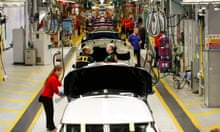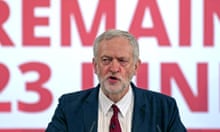Low-income households are likely to shoulder a disproportionate share of the costs of Brexit if the UK votes to leave the EU in this month’s referendum, a respected thinktank has warned.
Under a worst-case scenario, some low-income households could lose as much as £5,542 a year in tax credits and benefit payments in 2020, according to the National Institute of Economic and Social Research.
In the first detailed analysis of the possible impact on poorer households from Brexit, NIESR concludes that leaving the EU would mean lower tax receipts – forcing the government to shake up tax and spending policies to meet tough goals set under George Osborne’s fiscal charter, in order to get the public finances into surplus.
Angus Armstrong, one of the report’s authors, said: “Our analysis combines the consensus of macroeconomic forecasts with the spirit of the government’s fiscal charter. Based on these assumptions, our results show that a disproportionately large share of the costs of Brexit is likely to fall on low-income households.”
NIESR emphasised that any benefit cuts for low-income households would come on top of other losses that some economists estimate households would suffer from the impact on trade of leaving the EU.
Co-author Katerina Lisenkova said: “Low-income households could lose in two ways: their share of the loss of national income plus lower welfare payments in order to meet the spirit of the fiscal charter.”
NIESR used various scenarios where the government turns to welfare cuts to varying extents to cover the shortfall in the public finances. In the worst case, where 100% of the burden of achieving a surplus is put on welfare spending, the thinktank calculated that by 2020 different categories of low-income households could receive between £1,861 and £5,542 a year less in tax credits and benefits.
Assuming the government places 50% of the burden of adjustment on welfare spending, low-income households – defined as households receiving tax credits or jobseekers’ allowance – could receive between £930 and £2,771 a year less in tax credits and benefit payments in 2020.
With just two weeks to go until the 23 June referendum, the NIESR analysis provoked a reaction from leave campaigners who said many economists have overlooked the potential economic benefits from being outside the EU.
Patrick Minford, co-chair of the group Economists for Brexit, accused the thinktank of using “flawed Brexit assumptions” in its calculations.
“These assumptions are the worst possible ones for Brexit as they assume the UK continues with EU protectionism after leaving the EU, so that we have even less free trade than within the EU,” said Minford.
On his group’s analysis, if the UK gets a World Trade Organisation deal under which it would have the same rights to export to the EU as the US, there would be substantial economic benefits, Minford added.
“There is 4% extra growth, more jobs, and an 8% fall in consumer prices. The public finances are projected to improve. The average household is £40 a week better off. The poorest households, for whom food is a much larger proportion of their budgets, gain proportionately more than 8%.”
But NIESR estimated Brexit could put substantial pressure on the public finances and would be likely to force benefits cuts.
The thinktank estimated the hit to GDP from Brexit – based on its own and other previous analyses – and then calculated the likely effect on the public finances. Under a scenario where leaving the EU takes 3.1% off GDP by 2020 there would be a £44bn fiscal shortfall that year, NIESR estimated.
To close the gap, the government would be able to take various steps such as raising taxes and not just cut welfare spending, said the NIESR report. But with areas such as education and health spending ringfenced from cuts, welfare would probably take some of the burden.
“In absolute terms, lone parents with two children stand to lose the most from changes in welfare spending due to Brexit,” the NIESR report concluded. “Even when the welfare budget bears just 25% of the fiscal adjustment to fill the fiscal shortfall due to Brexit, this group stands to lose £1,386 a year in 2020.
“As a percentage of gross annual household income, unemployed individuals stand to lose the most from changes in welfare spending due to Brexit.”
NIESR based its analysis on the assumption that the government would continue to target a surplus on the public finances by the end of this decade – in other words, that over a year it takes in more than it spends.
Under the current budget rules, there is some wriggle room on achieving a surplus when economic growth slows sharply. If the Office for Budget Responsibility, the independent fiscal watchdog, deems there is a “significant negative shock to the UK” the surplus target can be suspended and it is quite possible such a case would arise after Brexit.
But Armstrong, who is the thinktank’s director of macro-economics, said using the “spirit of the fiscal charter” in this analysis was still valid because even under an economic shock the government would still have to present a plan of how to return to surplus.
NIESR said the research was funded by the bank JP Morgan but that the thinktank itself had full editorial control and an agreement with the funding provider to publish the results whatever they showed.









Comments (…)
Sign in or create your Guardian account to join the discussion